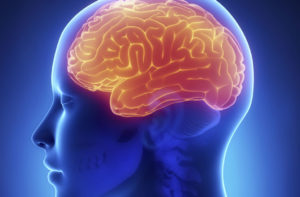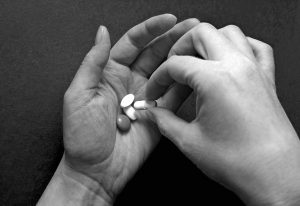Whether you’re Biglaw or SmallLaw or government law or stay-at-home-parent law, there are a few things that are important to pay attention to every day. Keeping a positive outlook is one of them. Attorney Garry T. Ross offers up some great ideas on how to do just that. Read his blog here.
6 Tips for Lawyers On Maintaining A Positive Outlook
15 Survival Tips for Anyone Living With a Mixture of Anxiety and Depression
Blogger Sarah Hughes writes, “I never got along with Anxiety, but my relationship with Depression was a whole different story. We despised each other. It was a deep loathing I had never felt before. We had formed a brutal rivalry, the only casualties on my side. It was every man for himself. Depression was a lot worse to me than Anxiety ever was. I think it’s because Depression had me brainwashed, kind of like the older guy you date in high school who you’re madly in love with, but he has you believing the entirety of your self-worth is dependent upon what he says.” Sarah recovered and offer these 15 tips. Read her blog.
These 11 Habits of People With Concealed Depression
Blogger Lexi Herrick writes, “Depression often goes unseen, unrecognized, and undiagnosed. A person with concealed depression is someone who is conditioned to deal with their inner demons in a way that doesn’t make them clearly visible. They may or may not be diagnosed, and this may or may not be something they’ve shared with even their closest of companions. The problem is that the world becomes darkest when we all stop being able to understand each other. We tend to believe that hardship is worn openly upon one’s chest like a battle scar, but many of these wounds do not easily reveal themselves to those that do not take the time to look.” Read the rest of her blog.
How to Prevent Stress From Shrinking Your Brain
 Have you ever felt so stressed out and overwhelmed that you can’t think straight? We now know that prolonged stress or trauma is associated with decreased volume in areas of the human brain responsible for regulating thoughts and feelings, enhancing self-control, and creating new memories. A new research study, published in today’s issue of Nature Medicine, is a first step in uncovering the genetic mechanism underlying these brain changes.
Have you ever felt so stressed out and overwhelmed that you can’t think straight? We now know that prolonged stress or trauma is associated with decreased volume in areas of the human brain responsible for regulating thoughts and feelings, enhancing self-control, and creating new memories. A new research study, published in today’s issue of Nature Medicine, is a first step in uncovering the genetic mechanism underlying these brain changes.
Depressed People’s Brains are More FragmentedIn this study, conducted by Professor Richard Dumin and colleagues from Yale University, scientists compared the genetic makeup of donated brain tissue from deceased humans with and without major depression. Only the depressed patients’ brain tissues showed activation of a particular genetic transcription factor, or “switch.” While each human cell contains more than 20,000 genes, only a tiny fraction of them are expressed at a given time. Transcription factors, when activated, act like light switches, causing genes to be turned on or off. This transcription factor, known as GATA1, switches off the activity of five genes necessary for forming synaptic connections between brain neurons. Brain neurons or nerve cells contain branches or dendrites that send and receive signals from other cells, leading to interconnected networks of emotion and cognition. The scientists hypothesized that in the depressed patients’ brains, prolonged stress exposure led to a disruption of brain systems involved in thinking and feeling. Depressed brains appeared to have more limited and fragmented information processing abilities. This finding may explain the pattern of repetitive negative thinking that depressed people exhibit. It is as if their brains get stuck in a negative groove of self-criticism and pessimism. They are unable to envision more positive outcomes or more compassionate interpretations of their actions.
Glucocorticoids Damage Brain Neurons
The stress response involves activation of a brain region known as the amygdala, which sends a signal alerting the organism to the threat. This results in activation of the HPA (hypothalamic-pituitary-adrenal) axis and release of a cascade of hormones, including cortisol, widely regarded as the quintessential “stress hormone.” While short-term cortisol release prepares the organism to sustain “fight or flight” and fend off an attacker, long-term exposure appears to cause brain neurons to shrink and interferes with their ability to send and receive information via branches called dendrites. In animal studies, under chronically stressful conditions, glucocorticoids such as cortisol can remain elevated for long periods.
Traumatic Experiences Can Shrink the Hippocampus in Those Who Don’t Recover
This finding is another piece of the puzzle regarding how stress and prolonged distress may impair our ability to think in creative and flexible ways. Research in both mice and humans has demonstrated an association between stress exposure (foot shock in mice, life events in humans) and shrinking of the hippocampus – the brain center responsible for forming new, time-sequenced memories. Studies in women with PTSD resulting from childhood sexual abuse and Vietnam veterans with PTSD have shown 12-26 percent decreases in hippocampal volume, relative to those without PTSD. In another study, patients recovered from long-term major depression showed a 15 percent decrease in volume of the hippocampus, compared to non-depressed patients.
Major Life Stress Damages the Prefrontal Cortex
In addition to hippocampal shrinkage, major life stress may shrink brain neurons in the Prefrontal Cortex (PFC), the brain area responsible for problem-solving, adaptation to challenge, emotional processing and regulation, impulse control, and regulation of glucose and insulin metabolism. In a study of 100 healthy participants conducted by Dr. Rajita Sinha and colleagues at Yale University, and published in the journal Biological Psychiatry, those with more adverse life events had greater shrinkage of gray matter in the PFC, compared to their less-stressed peers. Recent major life events, such as a job loss, make people less emotionally aware while life traumas, such as sexual abuse, seem to go further, in damaging mood centers that regulate pleasure and reward, increasing vulnerability to addiction and decreasing the brain’s ability to bounce back.
Summary
While the evidence is not yet conclusive, these studies suggest that prolonged exposure to stress can shrink the brain, both via the damaging effects of cortisol on brain neurons and by disrupting expression of genes that facilitate neuronal connections. This raises the question of whether there is anything we can do to prevent such damage. Since we can’t always control how much we are exposed to financial, relationship, or illness stress, are there preventive activities we can do to maintain cognitive resilience so we can continue to deal effectively with the stressors? It is not known if we can reverse the damage by these methods, but we may lessen it and make our brains more resilient to stress.
Brain-Enhancing Activities to Combat Stress
While the below list is not exhaustive, the three activities below have enhanced brain functioning in controlled studies.
Take a Daily DHA Supplement – DHA or Docosahexaenoic acid is an Omega-3 fatty acid that is a central building block of brain tissue. DHA is thought to combat the inflammatory effects of cortisol and the plaque buildup associated with vulnerability to Alzheimer’s disease. According to Dr. Mehmet Oz, in one study, a dose of 600mg of DHA taken daily for 6 months led the brain to perform as if it were three years younger.
Exercise Most Days – In studies with mice exercise led to a more improved performance on cognitive tasks than exposure to enriched environments with lots of activities and stimulation. Exercise leads to increases in BDNF or brain-derived neurotropic factor, a substance that strengthens brain cells and neuronal connections. BDNF is also thought to promote neurogenesis or the creation of new brain cells from existing stem cells in the hippocampus. Although these effects can’t be studied in living human brains, researchers have found increases in BDNF in the bloodstream of humans following workouts.
Do Yoga, Meditate, or Pray – These activities can activate what scientist Herb Benson at Massachusetts General Hospital calls “the relaxation response,” which lowers blood pressure and heart rate and lowers subjective anxiety. Benson and scientists from a genetics institute showed, in a recent study, that inducing the relaxation response can beneficially alter the expression of genes involved in inflammation, programmed cell death and how the body handles free radicals. The effects shown were in the same genes implicated in PTSD and depression. According to Jeffery Dusek, Ph.D., co-lead author of the study, “Changes in the activation of these same genes have previously been seen in conditions such as post-traumatic stress disorder; but the relaxation-response-associated changes were the opposite of stress-associated changes and were much more pronounced in the long-term practitioners.”
About the Author
Melanie Greenberg, Ph.D. is a licensed Clinical Psychologist and expert on Mindfulness and Positive Psychology. Dr. Greenberg provides workshops and speaking engagements for organizations, life, weight loss, or career coaching, and psychotherapy for individuals and couples. Visit her website: http://www.drmelaniegreenberg.biz
This article originally appeared in Psychology Today.
Other People’s Judgements About Our Depression
We all dish out opinions and advice whether asked for or not.
Much of it harmless; some, necessary and kind.
Then there’s those we dole out without knowing what the hell we’re talking about. Where we should tread carefully, we lumbar.
For better or worse, there’s tremendous power in words we use to express our opinions. When vulnerable – as we are during depression – the critical or misguided words of others take on the ring of gospel truth. Some may blame us for our depression.
In one poll, 54% of Americans said they thought of depression as a “personal or emotional weakness”. This explains much of stigma surrounding not only depression but all mental illness.
In a recent survey, what do 43.8 percent of women state as the Number 1 reason for not telling someone they were depressed?
“Others would think I am weak or think less of me.“
What do 57 percent state as their Number 1 reason?
“I believe I will get over it by myself”, followed by the same reason as women, the fear of being seen as weak, at 32 percent.
In the book, Unholy Ghosts: Writers on Depression, author Susanna Kaysen writes:
“The Failure of Will theory is popular with people who are not depressed. Get out and take your mind off yourself, they say. You’re too self-absorbed. This is just about the stupidest thing you can say to a depressed person, and it is said every day to depressed people all over this country. And if it isn’t that, it’s, shut up and take your Wellbutrin. These attitudes are contradictory. Conquer Your Depression and Everything Can Be Fixed by the Miracle of Science presuppose opposite explanations of the problem. One blames character, the other neurotransmitters. They are often thrown at the sufferer in sequence: Get out and do something, and if that doesn’t work, take pills. Sometimes they’re used simultaneously: You won’t take those pills because you don’t WANT to do anything about your depression, i.e. Failure of Will.”
Some just don’t think of it as the illness it is, but an excuse not to work hard.
Years ago, when I first told my three law partners that I was diagnosed with major depression and would need to take time off from work. They sat there stunned. After a moment of awkward silence, one partner said, “What in the world do you have to be depressed about? You’ve got a great job, wife, family and friends. Take a vacation!”
His anger humiliated me. “What’s wrong with me?” I thought.
I later learned that his reaction was, sadly, all too common. His judgment was that a lack of gratefulness was at the root of my distress. If only I jetted to Florida and sat under a palm counting my blessings, I would be depression-free.
For some time, these types of comments hurt me. They made me feel less-than. But after a while, they often made me angry. I thought, “What the hell do I have to do to be worthy of their mercy?” In retrospect, it wasn’t a question of my worthiness, but their ignorance. They didn’t have an emotional reference point for depression. They thought of it as stress, or, at worst, a bit of burnout. I recall a surgeon friend of mine (you would think that he, as a medically trained person, would know better!) telling me I was just in a “funk.” And then he said, “You want to see people who really have a right to be depressed? You should see the poor people with little money take two bus rides just to get to my office!”
Another painful innuendo. I had no right to be depressed, he must have thought. I was an upper-middle class professional, after all.
Some people (friends, family and business associates) will never be able to overcome the inertia of their own ignorance. They’re not bad people. It’s just the way life is. And we have to learn to be okay with that.
One of my best friends who has struggled with depression the past five years is frustrated by his wife’s lack of interest in talking to him about his depression. “Why doesn’t she love me, Dan?” “It’s not that she doesn’t love you,” I replied. “It might just be that she’s not capable of understanding in the way you want her to.”
But then there are others. These precious souls – and there don’t have to be lots of them – who have our back. They truly want to understand and help. Mother Teresa was once asked by a hard-boiled reporter what God expects of humanity. I think the reporter expected some stock answer. Mother Teresa, in all her gracious dignity, said that all God really wants from us to be is a “loving presence” to one another. There are those in our lives who want to be that presence to us.
Give them the chance to be that light.
Why So Many Lawyers Suffer From So Much Depression
As to being happy, I fear that happiness isn’t in my line. Perhaps the happy days that Roosevelt promises will come to me along with others, but I fear that all trouble is in the disposition that was given to me at birth, and so far as I know, there is no necromancy in an act of Congress that can work a resolution there.” – Benjamin N. Cardozo, February 15, 1933
Law is a prestigious and remunerative profession, and law school classrooms are full of fresh candidates. In a recent poll, however, 52% of practicing lawyers describe themselves as dissatisfied. Certainly, the problem is not financial. Associates at top firms could earn up to $200,000 per year just starting out, and lawyers long ago surpassed doctors as the highest-paid professionals. In addition to being disenchanted, lawyers are in remarkably poor mental health. They are at much greater risk than the general population for depression. Researchers at John Hopkins University found statistically significant elevations of major depressive disorder in only 3 of 104 occupations surveyed. When adjusted for sociodemographics, lawyers topped the list, suffering from depression at a rate of 3.6 times higher than employed persons generally. ( A more recent study from 2016 found that lawyer suffered from depression at a rate nearly three times that of the general public). Lawyers also suffer from alcoholism and illegal drug use at rates far higher than nonlawyers. The divorce rate among lawyers, especially women, also appears to be higher than the divorce rate among other professionals. Thus, by any measure, lawyers embody the paradox of money losing its hold. They are the best-paid professionals, and yet they are disproportionately unhappy and unhealthy. And lawyers know it; many are retiring early or leaving the profession altogether.
Positive Psychology sees three principal causes of the demoralization among lawyers.
Pessimism
First is pessimism, defined not in the colloquial sense (seeing the glass as half empty) but rather as the pessimistic explanatory style. These pessimists tend to attribute the causes of negative events as stable and global factors (“It’s going to last forever, and it’s going to undermine everything.”). The pessimist views bad events as pervasive, permanent, and uncontrollable, while the optimist sees them as local, temporary and changeable. Pessimism is maladaptive in most endeavors: Pessimistic life insurance agents sell less and drop out sooner than optimistic agents. Pessimistic undergraduates get lower grades, relative to their SAT scores and past academic record, than optimistic students. Pessimistic swimmers have more substandard times and bounce back from poor efforts worse than do optimistic swimmers. Pessimistic pitchers and hitters do worse in close games than optimistic pitchers and hitters. Pessimistic NBA teams lose to the point spread more often than optimistic teams.
Thus, pessimists are losers on many fronts. But there is one glaring exception: Pessimists do better at law. We tested the entire entering class of the Virginia Law School in 1990 with a variant of the optimism-pessimism test. These students were then followed throughout the three years of law school. In sharp contrast with the results of prior studies in other realms of life, the pessimistic law students on average fared better than their optimistic peers. Specifically, the pessimist outperformed more optimistic students on the traditional measures of achievement, such as grade point averages and law journal success.
Pessimism is seen as a plus among lawyers because seeing troubles as pervasive and permanent is a component of what the law profession deems prudence. A prudent perspective enables a good lawyer to see every conceivable snare and catastrophe that might occur in any transaction. The ability to anticipate the whole range of problems and betrayals that non-lawyers are blind to is highly adaptive for the practicing lawyer who can, by so doing, help his clients defend against these far-fetched eventualities. If you don’t have this prudence to begin with, law school will seek to teach it to you. Unfortunately, though, a trait that makes you good at your profession does not always make you a happy human being.
Sandra is a well-known East Coast psychotherapist who is, I think, a white witch. She has one skill that I have never seen in any other diagnostician: She can predict schizophrenia in preschoolers. Schizophrenia is a disorder that does not become manifest until after puberty, but since it is partly genetic, families who have experienced schizophrenia are very concerned about which of their children will come down with it. It would be enormously useful to know which children are particularly vulnerable because all manner of protective, social and cognitive skills might be tried to immunize the vulnerable child. Families from all over the eastern United States send Sandra their 4-year-olds; she spends an hour with each of them and makes an assessment of the child’s future likelihood of schizophrenia, an assessment that is widely thought of as uncannily accurate.
This skill of seeing the underside of innocent behavior is super for Sandra’s work, but not for the rest of her life. Going out to dinner with her is an ordeal. The only thing she can usually see is the underside of the meal – people chewing. Whatever witchy skill enables Sandra to see so acutely the underside of the innocent-looking behavior of a 4-year-old does not get turned off during dinner, and it prevents her from thoroughly enjoying normal adults in normal society. Lawyers, likewise, can not easily turn off their character trait of prudence (or pessimism) when they leave the office. Lawyers who can see clearly how badly things might turn out for their clients can also see clearly how badly things might turn out for themselves. Pessimistic lawyers are more likely to believe they will not make partner, that their profession is a racket, that their spouse is unfaithful, or that the economy is headed for disaster much more readily than will optimistic persons. In this manner, pessimism that is adaptive in the profession brings in its wake a very high risk of depression in personal life. The challenge, often unmet, is to remain prudent and yet contain this tendency outside the practice of law.
Low Decision Latitude
A second psychological factor that demoralizes lawyers, particularly junior ones, is low decision latitude in high-stress situations. Decision latitude refers to the number of choices one has – or, as it turns out, the choices one believes one has – on the job. An important study of the relationship of job conditions with depression and coronary disease measures both job demands and decision latitude. There is one combination particularly inimical to health and moral: high job demands coupled with low decision latitude. Individuals with these jobs have much more coronary disease and depression than individuals in other three quadrants.
Nurses and secretaries are the usual occupations consigned to that unhealthy category, but in recent years, junior associates in major firms can be added to the list. These young lawyers often fall into this cusp of high pressure accompanied by low choice. Along with the shared load of law practice (“this firm is founded on broken marriages”), associates often have little voice about their work, only limited contact with their superiors, and virtually no client contact. Instead, for at least their first few years of practice, many remain isolated in a library, researching and drafting memos on topics of the partners’ choosing.
A Win-loss Game
The deepest of all the psychological factors making lawyers unhappy is that American law is becoming increasingly a win-loss game. Barry Schwartz distinguishes practices that have their own internal “goods” as a goal from free-market enterprises focused on profits. Amateur athletics, for instance, is a practice that has virtuosity as its good. Teaching is a practice that has learning as its good. Medicine is a practice that has healing as its good. Friendship is a practice that has intimacy as its good. When these practices brush up against the free market, their internal goods become subordinated to the bottom line. Night baseball sells more tickets, even though you cannot really see the ball at night. Teaching gives way to the academic star system, medicine to managed care, and friendship to what-have-you-done-for-me-lately. American law has similarly migrated from being a practice in which good counsel about justice and fairness was the primary good to being a big business in which billable hours, take-no-prisoners victories, and the bottom line are now the principle ends.
Practices and their internal goods are almost always win-win-games: both teacher and student grow together, and successful healing benefits everyone. Bottom-line businesses are often, but not always, closer to win-loss games: managed care cuts mental health benefits to save dollars; star academics get giant raises from a fixed pool, keeping junior teachers at below-cost-of-living raises; and multi-billion dollar lawsuits for silicon implants put Dow-Corning out of business. There is an emotional cost to being part of a win-loss endeavor. In Chapter 3 of my book, I argue that positive emotions are the fuel of win-win (positive-sum) games, while negative emotions like anger, anxiety, and sadness have evolved to switch in during win-loss games. To the extent that the job of lawyering now consists of more win-loss games, there is more negative emotion in the daily life of lawyers.
Win-loss games cannot simply be wished away in the legal profession, however, for the sake of more pleasant emotional life among its practitioners. The adversarial process lies at the heart of the American system of law because it is thought to be the royal road to truth, but it does embody a classic win-loss game: one side’s win equals exactly the other side’s loss. Competition is at its zenith. Lawyers are trained to be aggressive, judgmental, intellectual, analytical and emotionally detached. This produces predictable emotional consequences for the legal practitioner: he or she will be depressed, anxious and angry a lot of the time.
Countering Lawyer and Unhappiness
As Positive Psychology diagnoses the problem of demoralization among lawyers, three factors emerge.Pessimism, low decision latitude, and being part of a giant win-loss enterprise. The first two each have an antidote. I discussed part of the antidote for depression in Chapter 6, in my book
Pessimism, low decision latitude, and being part of a giant win-loss enterprise. The first two each have an antidote. Chapter 6 of my book details a program for lastingly and effectively countering catastrophic thoughts. More important for lawyers is the pervasive dimension-generalizing pessimism beyond the law – and there are exercises in Chapter 12 of my book, Learned Optimism that can help lawyers who see the worst in every setting to be more discriminating in the other corners of their lives. The key move is credible disputation: treating the catastrophic thoughts (“I’ll never make partner,” “My husband is probably unfaithful”) as if they were uttered by an external person whose mission is to make your life miserable, and then marshaling evidence against the thoughts. These techniques can teach lawyers to use optimism in their personal lives, yet maintain the adaptable pessimism in their professional lives. It is well documented that flexible optimism can be taught in a group setting, such as a law firm or class. If firms and schools are willing to experiment, I believe the positive effects on the performance and moral of the young lawyers will be significant.
As to the high pressure-low decision latitude problem, there is a remedy as well. I recognize that grueling pressure is an inescapable aspect of law practice. Working under expanded decision latitude, however, will make young lawyers both more satisfied and more productive. One way to do this is to tailor the lawyer’s day so there is considerably more personal control over work. Volvo solved a similar problem on the assembly lines in the 1960’s by giving its workers the choice of building a whole car in a group, rather than repeatedly building the same part. Similarly, a junior associate can be given a better sense of the whole picture, introduced to clients, mentored by partners, and involved in transactional discussions. Many law firms have begun this process as they confront the unprecedented resignations of young associates.
The zero-sum nature of law has no easy antidote. For better or for worse, the adversarial process, confrontation, maximizing billable hours, and the “ethic” of getting as much as you possibly can for your clients are much too deeply entrenched. More pro bono activity, more mediation, more out-of-court settlements, and “therapeutic jurisprudence” are all in the spirit of countering the zero-sum mentality, but I expect these recommendations are not cures, but Band-Aids. I believe the idea of signature strengths, however, may allow law to have its cake and eat it too – both to retain the virtues of the adversarial system and to create happier lawyers.
When a young lawyer enters a firm, he or she comes equipped not only with the trait of prudence in lawyerly talents like high verbal intelligence, but with an additional set of unused signature strengths (for example, leadership, originality, fairness, enthusiasm, perseverance, or social intelligence). As lawyers’ jobs are crafted now, these strengths do not get much play. Even when situations do call for them, since the strengths are unmeasured, handling these situations does not necessarily fall to those who have the applicable strengths.
Every law firm should discover what the particular signature strengths of their associates are. Exploiting these strengths will make the difference between a demoralized colleague and an energized, productive one. Reserve five hours of the work week for “signature strength time,” a non-routine assignment that uses individual strengths in the service of the firm’s goals.
There is nothing particular to the field of law in the re-crafting of jobs. Rather, there are two basic points to keep in mind as you think about these examples and try to apply them to your work setting. The first is that the exercise of signature strengths is almost always a win-win game. When Stacy gathers the complaints and feelings of her peers, they feel increased respect for her. When she presents them to the partners, even if they don’t act, the partners learn more about the morale of their employees – and of course, Stacy herself derives authentic positive emotion from the exercise of her strengths. This leads to the second basic point: There is a clear relation between positive emotion at work, high productivity, low turnover and high loyalty. The exercise of a strength releases positive emotion. Most importantly, Stacy and her colleagues will likely stay longer with the firm if their strengths are recognized and used. Even though they spend five hours each week on non-billable activity, they will, in the long run, generate more billable hours.
Law is intended as but one rich illustration of how an institution (such as a law firm) can encourage its employees to re-craft the work they do, and how individuals within any setting can reshape their jobs to make them more gratifying. To know that a job is a win-loss in its ultimate goal – the bottom line of a quarterly report, or a favorable jury verdict – does not mean the job cannot be win-win in its means to obtaining that goal. Competitive sports and war are both eminently win-loss games, but both sides have many win-win options. Business and athletic competitions, or even war itself, can be won by individual heroics or by team building. There are clear benefits of choosing the win-win option by using signature strengths to better advantage. This approach makes work more fun, transforms the job or the career into a calling, increases flow, builds loyalty, and it its decidedly more profitable. Moreover, by filling work with gratification, it is a long stride on the road to the good life.
Martin E. P. Seligman, Ph.D., is the Fox Leadership Professor of Psychology at the University of Pennsylvania, the Director of the Positive Psychology Network, and former President of the American Psychological Association. Among his 20 books are Learned Optimism and The Optimistic Child. Here, from his book Authentic Happiness: Using the New Positive Psychology to Realize Your Potential for Lasting Fulfillment, is his chapter entitled “Why Are Lawyers So Unhappy?”
© by Martin Seligman. Reprinted with permission from the author.
Are you a law student or lawyer struggling with depression? Do you need help developing a practical, constructive game plan to help you cope and recover from depression? If so, I can help. I created my life coaching practice specifically devoted to helping law students and lawyers who struggle with this condition. Visit my website at www.yourdepression.com to learn more.Share this:
The Blues Is Depression. Should You Treat It With Pills?
What people refer to as the blues is usually depression. Depression, or the blues, is an unpleasant emotional state characterized by what therapists refer to as “the negative cognitive triad.” That’s 1) negative thoughts about oneself, which are the voices of your inner critic harping on you for what you supposedly have done wrong, should have done differently, and on and on 2) negative thoughts about others that lead you to see what you don’t like in them instead of heeding their virtues and enjoying them, creating relationship problems and 3) negative thoughts about the future.
Some people describe the blues, and also depression, as feeling like there’s a dark cloud over you. Others refer to depression as seeing the world through dark glasses. Feelings of hopelessness and helplessness are another indicator.
How can you get rid of your blues and your inner critic by treating the underlying depression?
There are four main strategies:
- Change your feelings.Take pills or use one of the newer treatment methods that change your bluesy mood by changing your inner body chemistry and brain functioning.
- Change your thoughts. Eliminating the inner critic may get rid of the depressed, bluesy feelings.
- Change your actions. Get exercise. Go out and be with people. Express more gratitude. Do acts of kindness.
- Identify and address the problem that initially triggered your depressed feelings and thoughts. Find a new solution and both the negative feelings and the negative thoughts will evaporate.
Why do people take antidepressant medications?
There are four main reasons why people who may be distressed by something in their lives end up defining their depression as an illness and taking medication.
First and foremost, depression is a terrible feeling that sufferers sorely want to get rid of.
Second, most folks have not been fully informed of the medications’ downsides. I’ll elaborate on drug dependency below. In addition, these medications can cause serious weight gain, a significant drop in libido (ability to enjoy sex), hazy thinking, and a general emotional numbness that blocks feelings of joy in addition to feelings of depression.
Third, people who take the medications may not have been informed of their relatively low rate of effectiveness. They can be effective if they work, but they only work for something like about 60% of people who use them.
Fourth, most people who take anti-depressant medications have not been informed by their doctor about alternative treatment options. To a man with a hammer, the world is a nail. Physicians know about illness and prescribe medications. As psychologist Martin Seligman has explained, depression is a relatively normal, if quite unpleasant and often self-defeating, response of giving up in response to a challenging life circumstance.
What are the downsides of assuming that depression is an illness and therefore needs pills?
As mentioned above, two particularly negative side effects of medication that doctors do not sufficiently explain include potential weight gain and decreases inability to experience sexual arousal. Doctors may mention them but often do not clarify that both extra pounds and decreased interest in sex can have strongly negative impacts on personal self-esteem, on attracting a mate and on sustaining a marriage.
The other significant risk that doctors may or not fully explain is that users may have a hard time getting off these medications. When a drug company says that their anti-depressant medication is not addictive, strictly speaking, they are telling the truth. A strict clinical definition of an addictive substance or activity is one that induces both dependency and craving. Antidepressants do not induce craving. Over time they do, however, make users drug dependent.
Craving is a familiar feeling to anyone who has fallen in love. The intense sexual desire that drives someone in love to find every way possible to be near the object of their desire is a craving. Someone who craves alcohol similarly may wake up in the morning already urgently wanting a drink.
What does “drug dependent” mean? Drug dependency is the state a body goes into when it has adapted to the presence of a chemical to the point that the body requires steady doses of the substance to maintain normal functioning. We are all, for instance, chemically dependent on water.
Our society is highway-dependent. Many of us have become accustomed to having highways that enable us to drive to work from the suburbs. Having bought a house in the suburbs on the assumption that we can take the highway to work, we have become highway dependent. It’s unlikely that anyone has a craving for highways. Many of us though have become highway dependent.
If you for some time have been taking an antidepressant medication, the odds are that your body has become drug dependent. That means that if you should decide today that as of tomorrow you will no longer take the medication, starting tomorrow, you are likely to discover that without the pills that you normally take your body will plunge into a serious depressive state.
Does this depression mean that you need after all to stay on your meds because the pills are all that have stood between you and the depths of despair? Not at all. To the contrary, this depression means that your body has become dependent on the antidepressant pills. Is this addiction? No, but it is drug dependency.
I am not saying that no one should ever take antidepressant medication. They do help some people. Some people experience relatively few to zero negative side effects. My point is just that if you are considering taking these medications, or have for some time been using them, you deserve accurate information about the factors to take into account in your decision, including information about other treatment options.
Here are six vital points to consider.
1) There now are multiple excellent alternatives to medication for working your way out of depression, including various kinds of talk therapies such as CBT, energy therapies such as Bradley Nelson’s Emotion Code and Body Code, acupuncture, exercise, electrical stimulation of the brain, the visualization you can download for free from my website, or read about how to do on one of my other blogposts, couples therapy, and more.
2) Depression is induced by a situation in which you have experienced insufficient power. If you close your eyes and picture whom or what you may feel angry at, you will see an image of the trigger person or situation. Fix that situation, and your depression will be likely to go away.
3) If your doctor is recommending medication as a short-term fix, use the pills until you feel better. Use your renewed energy to address the power-loss situation. Then begin the medication-weaning process asap.
4) Wean slowly. Consult your prescribing doctor for an appropriate weaning schedule for the particular medication that you are taking.
5) Be aware that research has shown that the most powerful way to overcome depression and keep it far from you, in the long run, is the combination of therapy and medication. Medication alone and psychotherapy alone have very similar effectiveness rates, but medication has an impact more quickly, and psychotherapy tends to have more longer-lasting impacts.
6) There is a visualization exercise that you can do with a therapist, a friend, or on your own that may help you conquer the depression in just a few minutes. See my posting on A New Treatment for Depression.
6) In my clinical experience, I find that most depression is a response to relationship problems. Look into marriage education, couples counseling, or a combination of both to upgrade your relationship. These treatment routes can make you a double winner. You can both end the depression and simultaneously gain a vastly more gratifying marriage or romantic partnership.
Susan Heitler, Ph.D., a Denver Clinical psychologist, is an author of multiple publications including From Conflict to Resolution for therapists, The Power of Two and poweroftwomarriage.com for couples who want to strengthen their relationship. Dr. Heitler’s most recent book is Prescriptions Without Pills, with a free companion website at prescriptionswithoutpills.com.
Dan’s Top Video Picks on Depression
Films can teach us a lot about depression. Not only can they provide information. They can also move us emotionally by drawing us into the subject with interviews, animations, and other techniques that aren’t amenable to books. Here are my favorite videos that address the topic of depression.
Living with Depression
I came across this short video recently. And was very moved. It captures, with sublime music and moving images of a young woman, her struggles with clinical depression and the loneliness she endures. Powerful. Over four million people have viewed it. Running time is 3 minutes and 22 seconds
Weathering the Dead Zone of Depression
 There is a dead zone in a depressed person’s life where nothing seems to happen.
There is a dead zone in a depressed person’s life where nothing seems to happen.
Except for the pain of the absence of everything.
Such anguish is so overwhelming that every other concern is squashed in its wake. Our capacity for willful actions seems to be gone; we can’t “figure it out.”
We are stuck. And it sucks.
I have learned a lot about this “zone” over the years, its patterns, and how to handle it. It’s really like learning to surf a giant, dark wave. To handle these waves, you need to prepare yourself before the next big ones roll in.
When I’m entering a dead zone, I use positive affirmations I’ve created to “talk back” to my depression. I don’t let the toxic voice of depression drown me out. It’s important to empower yourself in whatever ways you can during these times because depression will lead you to falsely conclude that
Rethinking Lawyer Motivation
Lawyer and law firm consultant, Paula Davis-Laack writes, “Autonomy, connection to others, and competence are important because they drive motivation and engagement. For those of you focused on the bottom line, it has been shown that engaged employees perform better on a daily basis, and the higher a person’s level of engagement, the higher their objective financial returns.In addition, levels of employee engagement were positively related to business performance in the areas of customer satisfaction and loyalty, profitability, and productivity. That is, higher employee engagement translated into higher customer satisfaction and loyalty, higher profitability, and more productivity. Read her blog.
Built by Staple Creative




















